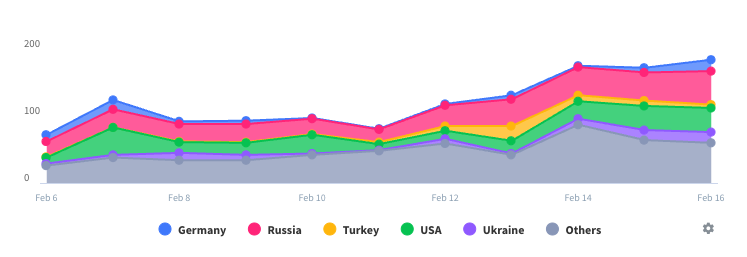App ist vorübergehend nicht verfügbar

Downloads
Umsatz
Beschreibung
Can you think in 3D but act in 2D?
WoL is a puzzle game to improve your spatial ability. Rotate the map to see the other perspective, each twist will reveal new ways to the cube. You will be absorbed for hours in the map to get new complications and satisfying solutions.
There is no time limit, move limit and points in the game. You just need to rotate the map and reach the green cube.
Features:
◈ Minimalist design
◈ 72 mind-blowing levels
◈ Relaxing music & sounds
◈ Enhances 3D thinking
◈ Sharpens the mind
◈ Exclusive for iOS
WHAT IS SPATIAL ABILITY?
Spatial ability is "the aptitude needed to mentally process three-dimensional images of objects." (Fleisig et al. 2004).
WHY IS SPATIAL ABILITY IMPORTANT?
"There is evidence which indicates that strong spatial skills are required for achievement in science, technology, engineering and mathematics (STEM) careers. Many people, including science and engineering professors, view such skills as important for success in fields like engineering." (Gutierrez, Dominguez, & Gonzalez, 2015)
CAN SPATIAL ABILITY BE FURTHER DEVELOPED?
"The level of spatial performance someone is capable of may change over time. You are likely to gain in performance through practice, training, and learning, but you may also lose in standing relative to others if they acquire more experience that supports their performance or make more progress in their intellectual development." (Johns Hopkins University, 2018)
If you wish to improve or retain the level of your spatial ability, Spatial Roll will be one of the best options.
Fleisig, R. V., A. Robertson, et al. (2004). Improving the Spatial Visualization Skills of First Year Engineering Students. Inaugural CDEN Design Conference, Montreal, Quebec.
Johns Hopkins University. (2018, August 28). Spatial Ability. Retrieved from http://www.jhu.edu: http://web.jhu.edu/cty/STBguide.pdf
Martin Gutierrez, J., Garcia Dominguez, M., & Roca Gonzalez, C. (2015). Using 3D virtual technologies to train spatial skills in engineering. International Journal of Engineering Education, 31(1), 323-334.
Ausblenden
Mehr anzeigen...
WoL is a puzzle game to improve your spatial ability. Rotate the map to see the other perspective, each twist will reveal new ways to the cube. You will be absorbed for hours in the map to get new complications and satisfying solutions.
There is no time limit, move limit and points in the game. You just need to rotate the map and reach the green cube.
Features:
◈ Minimalist design
◈ 72 mind-blowing levels
◈ Relaxing music & sounds
◈ Enhances 3D thinking
◈ Sharpens the mind
◈ Exclusive for iOS
WHAT IS SPATIAL ABILITY?
Spatial ability is "the aptitude needed to mentally process three-dimensional images of objects." (Fleisig et al. 2004).
WHY IS SPATIAL ABILITY IMPORTANT?
"There is evidence which indicates that strong spatial skills are required for achievement in science, technology, engineering and mathematics (STEM) careers. Many people, including science and engineering professors, view such skills as important for success in fields like engineering." (Gutierrez, Dominguez, & Gonzalez, 2015)
CAN SPATIAL ABILITY BE FURTHER DEVELOPED?
"The level of spatial performance someone is capable of may change over time. You are likely to gain in performance through practice, training, and learning, but you may also lose in standing relative to others if they acquire more experience that supports their performance or make more progress in their intellectual development." (Johns Hopkins University, 2018)
If you wish to improve or retain the level of your spatial ability, Spatial Roll will be one of the best options.
Fleisig, R. V., A. Robertson, et al. (2004). Improving the Spatial Visualization Skills of First Year Engineering Students. Inaugural CDEN Design Conference, Montreal, Quebec.
Johns Hopkins University. (2018, August 28). Spatial Ability. Retrieved from http://www.jhu.edu: http://web.jhu.edu/cty/STBguide.pdf
Martin Gutierrez, J., Garcia Dominguez, M., & Roca Gonzalez, C. (2015). Using 3D virtual technologies to train spatial skills in engineering. International Journal of Engineering Education, 31(1), 323-334.
Screenshots
WoL: Way of Looking Häufige Fragen
-
Ist WoL: Way of Looking kostenlos?
Ja, WoL: Way of Looking ist komplett kostenlos und enthält keine In-App-Käufe oder Abonnements.
-
Ist WoL: Way of Looking seriös?
Nicht genügend Bewertungen, um eine zuverlässige Einschätzung vorzunehmen. Die App benötigt mehr Nutzerfeedback.
Danke für die Stimme -
Wie viel kostet WoL: Way of Looking?
WoL: Way of Looking ist kostenlos.
-
Wie hoch ist der Umsatz von WoL: Way of Looking?
Um geschätzte Einnahmen der WoL: Way of Looking-App und weitere AppStore-Einblicke zu erhalten, können Sie sich bei der AppTail Mobile Analytics Platform anmelden.

Benutzerbewertung
Die App ist in Niederlande noch nicht bewertet.

Bewertungsverlauf
WoL: Way of Looking Bewertungen
Keine Bewertungen in Niederlande
Die App hat noch keine Bewertungen in Niederlande.
WoL: Way of Looking Installationen
Letzte 30 TageWoL: Way of Looking Umsatz
Letzte 30 TageWoL: Way of Looking Einnahmen und Downloads
Gewinnen Sie wertvolle Einblicke in die Leistung von WoL: Way of Looking mit unserer Analytik.
Melden Sie sich jetzt an, um Zugriff auf Downloads, Einnahmen und mehr zu erhalten.
Melden Sie sich jetzt an, um Zugriff auf Downloads, Einnahmen und mehr zu erhalten.
App-Informationen
- Kategorie
- Games
- Herausgeber
- Flat Games
- Sprachen
- English
- Letzte Veröffentlichung
- 1.0.0 (vor 3 Jahren )
- Veröffentlicht am
- Apr 8, 2021 (vor 3 Jahren )
- Auch verfügbar in
- Rumänien, Italien, Japan, Kuwait, Malaysia, Niederlande, Peru, Philippinen, Pakistan, Polen, Argentinien, Russland, Saudi-Arabien, Singapur, Thailand, Türkei, Taiwan, Vereinigte Staaten, Vietnam, Kanada, Tschechien, Dominikanische Republik, Algerien, Ägypten, Spanien, Schweiz, Vereinigtes Königreich, Brasilien, Australien, Vereinigte Arabische Emirate, Irland, Indien, Südafrika, Kolumbien, Ukraine, Schweden, Dänemark, Finnland, Neuseeland, Norwegen, Ungarn, Mexiko, Kasachstan, Indonesien, Israel
- Zuletzt aktualisiert
- vor 2 Monaten
- © 2024 AppTail.
- Unterstützung
- Privacy
- Terms
- All Apps





